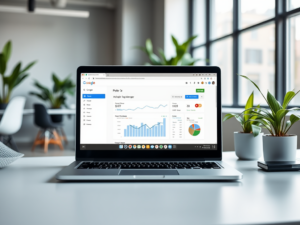
In an age where every click tells a story, the need for efficient management of digital marketing activities has never been more pressing. Businesses and marketers are increasingly turning towards automation tools to streamline their processes, maximize engagement, and enhance the overall effectiveness of their campaigns. Digital marketing automation enables marketers to deploy strategies that are not only powerful but also capable of transforming how they connect with their audiences. As consumer behavior continues to evolve, utilizing automation tools becomes essential for staying ahead of the competition. This article explores the multifaceted world of automation tools in digital marketing and provides insights that you need to harness their full potential.
With the right automation tools, organizations can significantly increase their operational efficiency. Automation frees up valuable time for marketing professionals, allowing them to shift their focus from mundane tasks to strategic planning and creative efforts. The result is not just a streamlined process but also a more agile marketing approach that can quickly adapt to changing trends and consumer demands. Additionally, the integration of automation tools leads to enhanced customer engagement. By leveraging data and personalization, marketers can create tailored experiences that resonate with their target audience. But navigating through the multitude of available tools can be daunting. Let’s break down the benefits, key tools, and strategies you need to succeed.
Benefits of Using Automation Tools

Employing automation tools in your marketing strategy provides a range of advantages that can elevate your business performance. Whether it’s saving time or improving ROI, each benefit plays a pivotal role in how marketing teams operate.
- Time Efficiency: Automating repetitive tasks reduces the time spent on manual processes.
- Enhanced Accuracy: Automation minimizes the risks of human errors in data management.
- 24/7 Operations: Automated systems can work around the clock, ensuring offers and updates are always available.
- Scalability: As your business grows, automation can scale to meet increased demands without significant additional investment.
Increased Efficiency
The significance of increasing efficiency cannot be overstated in a competitive market. Automation tools help teams to execute marketing campaigns faster, allowing for quicker testing and adaptation. Whether it’s deploying emails, managing social media posts, or running ads, automation ensures that these tasks occur without delay. By limiting manual processes, teams can spend more time focusing on developing compelling content and innovative strategies. Moreover, automating data analysis allows for immediate insights, enabling quicker decision-making regarding campaign adjustments and optimizations.
Improved ROI
Optimizing your marketing budget is crucial, and automation plays a significant role in achieving better returns on investment. By streamlining processes and improving customer targeting, businesses can expect to see a substantial increase in conversion rates. This optimization results from personalized marketing efforts that automation facilitates, assisting in retaining customers and encouraging repeat purchases. Over time, the more efficient your marketing efforts become, the greater the impact on profitability. A well-executed automated strategy translates into less wasted expenditure and smarter allocation of resources.
Key Automation Tools for Digital Marketing

In exploring automation tools, it’s essential to understand the various categories available and how they can be integrated into your marketing strategy. Below is a snapshot of popular tools across different channels:
| Tool | Purpose | Features |
|---|---|---|
| Mailchimp | Email Marketing | Campaign Automation, Segmentation, Analytics |
| Hootsuite | Social Media Management | Scheduling, Monitoring, Reporting |
| SEMrush | SEO | Keyword Research, Site Audit, Competitor Analysis |
| Google Analytics | Web Analytics | Traffic Analysis, Conversion Tracking, Custom Reports |
Email Marketing Automation
Email marketing remains a cornerstone of digital marketing, and automation has transformed how businesses communicate with their audience. Tools like Mailchimp and ActiveCampaign empower marketers to send targeted messages based on user behavior and preferences. With features such as A/B testing and detailed analytics, these platforms provide businesses with the tools needed to improve open and click-through rates. Additionally, automation allows for the timely delivery of onboarding sequences, promotional campaigns, and automated follow-ups, enhancing overall customer engagement.
Social Media Automation
In the realm of social media, automation tools like Hootsuite and Buffer offer powerful solutions for managing and optimizing social presence. By enabling users to schedule posts across multiple platforms, these tools ensure that content is published at the most effective times, even outside regular business hours. Analyzing engagement metrics becomes effortless with built-in reporting features, helping marketers understand what resonates with their audiences. Regularly monitoring brand sentiment is also made easier, allowing businesses to respond rapidly to customer feedback and trends.
Choosing the Right Automation Tool
Selecting the best automation tool for your business starts with understanding your specific needs and objectives. It’s vital to take a strategic approach when evaluating options to ensure that the tool you choose aligns with your marketing goals.
Understanding Your Needs
Prior to diving into software options, take the time to analyze your current marketing strategies. Identify pain points where automation could provide immediate assistance—be it in managing leads, nurturing prospects, or structuring content distribution. This self-assessment gives clarity on functionalities that matter most. Are you seeking tools for social media, email, or SEO? Your business goals will drive the best choices in automation. Consider conducting team discussions to gather insights on what features everyone feels would be beneficial.
Budget Considerations
While exploring automation tools, budget considerations cannot be ignored. Each tool has its pricing structures, with various models ranging from subscription-based services to tiered pricing depending on features. Determine your budget before shopping around, so you can evaluate which tools offer the best return on investment and feature set for your unique needs. It’s essential to balance cost against functionality and potential benefits—prioritizing tools that offer trial periods may also help you gauge effectiveness before committing financially.
Implementation Best Practices
Successfully integrating automation tools into your marketing strategy requires careful planning. Here are some best practices to ensure an effective rollout.
- Start Small and Scale: Focus on a few key areas for automation as initially diving into too much might overwhelm your team.
- Regular Monitoring and Adjustment: Stay attentive to the performance of your automated processes and make adjustments as necessary based on the data you collect.
- Team Training: Ensure that team members are trained on how to use automation tools effectively to maximize their benefits.
Conclusion
Automation tools offer a myriad of benefits that can streamline your digital marketing efforts. They bring efficiency, accuracy, and enhanced ROI to marketing operations, enabling businesses to connect and engage with their audiences better. However, success lies in the careful selection of the right tools and strategies tailored to meet your specific business goals. As you embark on your automation journey, remember that regular monitoring and adjustments are key to maximizing the impact of your efforts. With the right approach, you can wield the power of automation to navigate the ever-evolving landscape of digital marketing.
Frequently Asked Questions
- What is digital marketing automation? Digital marketing automation refers to using software tools to automate marketing processes, including email marketing, social media posting, lead scoring, and customer segmentation.
- How can automation tools improve my marketing efforts? Automation tools can streamline repetitive tasks, enhance targeting precision, improve data analysis, and increase overall efficiency in marketing efforts.
- Are automation tools expensive? Costs vary widely among different tools. Some may offer tiers based on usage, while others have monthly subscriptions. It’s essential to compare features and ROI to find a solution fitting your budget.
- Can I use multiple automation tools simultaneously? Yes, many businesses successfully integrate multiple tools to cover various aspects of their marketing strategy, ensuring comprehensive automation.
- How do I choose the right automation tool for my business? Consider your specific marketing needs, budget, and the scalability of the tool. Research options and read user reviews to determine which solution is the best fit for your goals.










